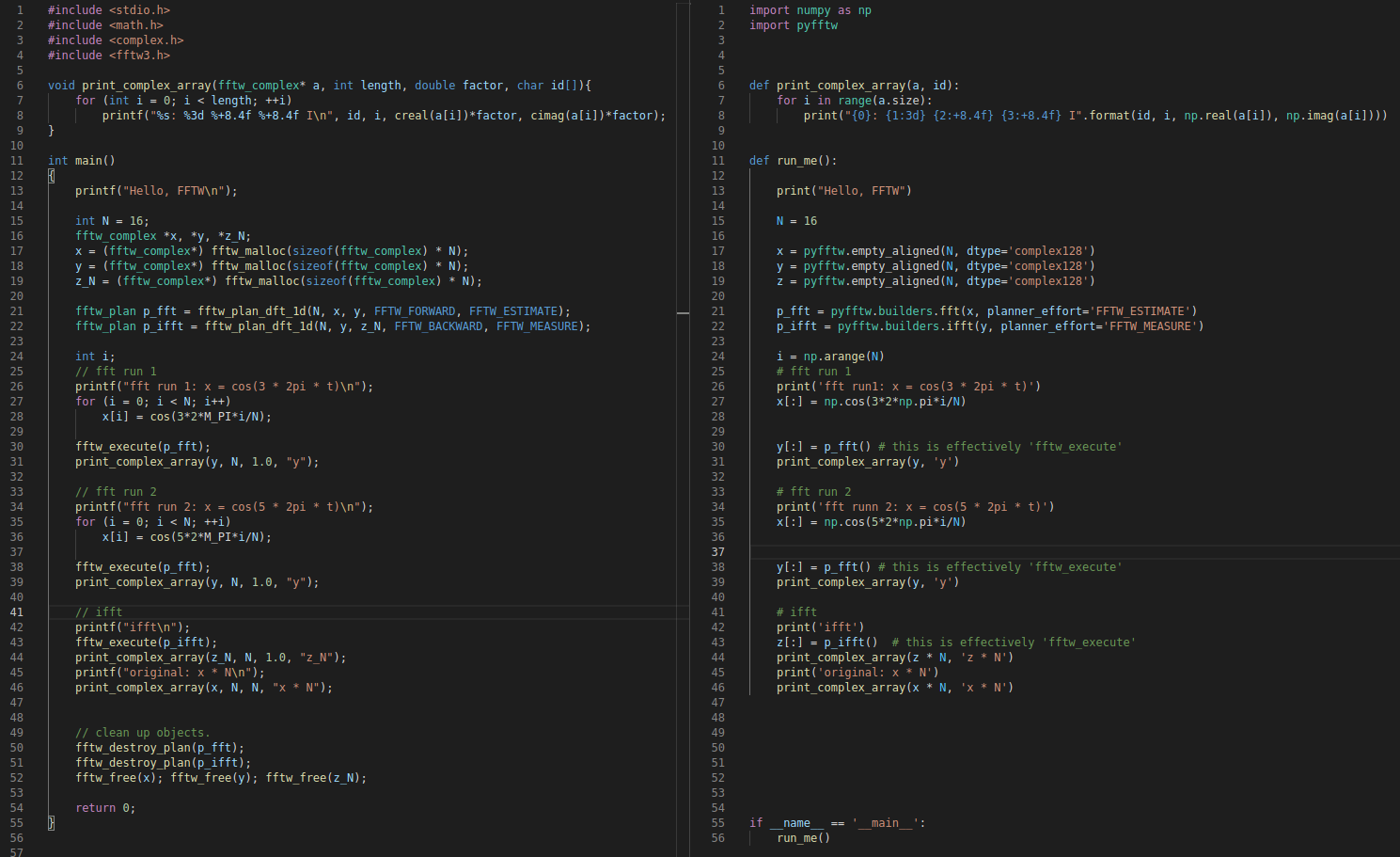Using FFTW and pyFFTW
\[X_{k} = \sum_{k=0}^{N-1} e^{-2\pi i k / N} x_i\]
FFTW is a popular C-library for computing the discrete Fourier transform and its documentation page provides comprehesive information on the library. For Python, pyFFTW provides an excellent wrapper. Below, we show a simple example in both C and Python versions to illustrate how the Python wrapper corresponds to the actual library.
Example
The example does the follow calls:
- allocate spaces for x, y, and z (z_N in C version), each of which has N complex numbers.
- set up fft and ifft plans.
- fft: from x to y
- ifft: from y to z (z_N in C version)
- fill x with cos(3 * pi * t) and call fft to get y.
- fill x with cos(5 * pi * t) and call fft to get a different y.
- call ifft on y to get z (z_N in C version)
- compared to x.
- In C, z_N is the same to x * N because the library does not include the scale factor.
- In Python, z is the same to x because the wrapper adds the scale factor.
Both versions together
To see both versions together, click the image below. The left panel is in C and the right panel is in Python. Extra spaces are added to the Python version so that the two versions are aligned line-by-line.
Codes: C
#include <stdio.h>
#include <math.h>
#include <complex.h>
#include <fftw3.h>
void print_complex_array(fftw_complex* a, int length, double factor, char id[]){
for (int i = 0; i < length; ++i)
printf("%s: %3d %+8.4f %+8.4f I\n", id, i, creal(a[i])*factor, cimag(a[i])*factor);
}
int main()
{
printf("Hello, FFTW\n");
int N = 16;
fftw_complex *x, *y, *z_N;
x = (fftw_complex*) fftw_malloc(sizeof(fftw_complex) * N);
y = (fftw_complex*) fftw_malloc(sizeof(fftw_complex) * N);
z_N = (fftw_complex*) fftw_malloc(sizeof(fftw_complex) * N);
fftw_plan p_fft = fftw_plan_dft_1d(N, x, y, FFTW_FORWARD, FFTW_ESTIMATE);
fftw_plan p_ifft = fftw_plan_dft_1d(N, y, z_N, FFTW_BACKWARD, FFTW_MEASURE);
int i;
// fft run 1
printf("fft run 1: x = cos(3 * 2pi * t)\n");
for (i = 0; i < N; i++)
x[i] = cos(3*2*M_PI*i/N);
fftw_execute(p_fft);
print_complex_array(y, N, 1.0, "y");
// fft run 2
printf("fft run 2: x = cos(5 * 2pi * t)\n");
for (i = 0; i < N; ++i)
x[i] = cos(5*2*M_PI*i/N);
fftw_execute(p_fft);
print_complex_array(y, N, 1.0, "y");
// ifft
printf("ifft\n");
fftw_execute(p_ifft);
print_complex_array(z_N, N, 1.0, "z_N");
printf("original: x * N\n");
print_complex_array(x, N, N, "x * N");
// clean up objects.
fftw_destroy_plan(p_fft);
fftw_destroy_plan(p_ifft);
fftw_free(x); fftw_free(y); fftw_free(z_N);
return 0;
}
Codes: Python
import numpy as np
import pyfftw
def print_complex_array(a, id):
for i in range(a.size):
print("{0}: {1:3d} {2:+8.4f} {3:+8.4f} I".format(id, i, np.real(a[i]), np.imag(a[i])))
def run_me():
print("Hello, FFTW")
N = 16
x = pyfftw.empty_aligned(N, dtype='complex128')
y = pyfftw.empty_aligned(N, dtype='complex128')
z = pyfftw.empty_aligned(N, dtype='complex128')
p_fft = pyfftw.builders.fft(x, planner_effort='FFTW_ESTIMATE')
p_ifft = pyfftw.builders.ifft(y, planner_effort='FFTW_MEASURE')
i = np.arange(N)
# fft run 1
print('fft run1: x = cos(3 * 2pi * t)')
x[:] = np.cos(3*2*np.pi*i/N)
y[:] = p_fft() # this is effectively 'fftw_execute'
print_complex_array(y, 'y')
# fft run 2
print('fft runn 2: x = cos(5 * 2pi * t)')
x[:] = np.cos(5*2*np.pi*i/N)
y[:] = p_fft() # this is effectively 'fftw_execute'
print_complex_array(y, 'y')
# ifft
print('ifft')
z[:] = p_ifft() # this is effectively 'fftw_execute'
print_complex_array(z * N, 'z * N')
print('original: x * N')
print_complex_array(x * N, 'x * N')
if __name__ == '__main__':
run_me()
